The indictment of congressional candidate Kat Abughazaleh has quickly evolved from a regional legal matter into a nationally discussed event, capturing the attention of activists, lawmakers, immigration advocates, and constitutional scholars across the country.
The charges—filed by a federal grand jury in Illinois—stem from demonstrations outside a U.S. Immigration and Customs Enforcement (ICE) detention facility in Broadview, Illinois.
The case sits at the intersection of multiple ongoing debates: the limits of civil disobedience, the role of federal agencies in immigration enforcement, the rights of protesters, and the responsibilities of political candidates who participate in activist movements.
While protests outside ICE facilities are not new, the decision to pursue federal charges against a congressional candidate has intensified scrutiny and raised complex questions that continue to ripple through national media.
A Closer Look at the Charges Filed Against Abughazaleh
According to the federal indictment filed on October 23, prosecutors allege that Abughazaleh engaged in actions that “physically hindered and impeded” a federal officer during the performance of official duties. The document names two core charges:
1. Conspiracy to impede a federal officer
This count alleges that Abughazaleh and five others engaged in coordinated actions intended to obstruct a federal agent working at the Broadview ICE facility. Prosecutors claim the group planned, organized, and executed efforts to interfere with the movement of official vehicles used to transport detainees.
2. Forcibly interfering with a federal employee
The second charge asserts that Abughazaleh stood directly in the path of a moving federal vehicle, forcing the driver to reduce speed dramatically. Federal agents maintain that the action created a dangerous situation, both for the protesters and for the officer attempting to complete a routine transfer of detainees.
The indictment points to video evidence, officer testimony, and additional surveillance footage from the surrounding area.
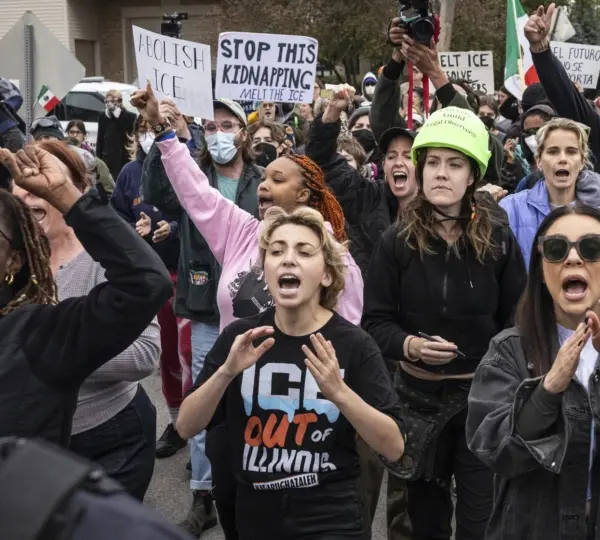
What Prosecutors Say Happened During the Protest
According to the Justice Department, the protest escalated beyond peaceful demonstration during several key moments:
-
Protesters allegedly surrounded ICE vehicles, forming human chains and chanting slogans.
-
Some individuals reportedly struck federal vehicles, causing scratches and minor damage.
-
Agents claim they were “significantly impeded” while trying to perform lawful duties inside the facility.
-
At one point, an officer inside a government SUV had to creep forward at “an extremely slow speed” to avoid injuring demonstrators.
-
The indictment suggests that these actions were “planned and encouraged” by multiple individuals, including Abughazaleh.
Federal officials characterized the demonstrations as “highly disruptive,” though they acknowledged that many of the protests remained peaceful.
The Broader Context: Why the Broadview ICE Facility Became a Flashpoint
The Broadview detention facility has long been a central gathering point for immigration advocates in Illinois.
Community members frequently gather outside the facility during deportation operations, vigils, and organized demonstrations, citing concerns about:
-
treatment of detainees
-
deportation practices
-
family separations
-
transparency regarding ICE procedures
-
the emotional toll on local immigrant communities
For years, Broadview has been a symbolic site for immigrant families who fear losing loved ones. Weekend vigils often attract faith groups, nonprofit leaders, and human rights organizations.
But in recent months, the activity intensified significantly. Protests grew larger, more frequent, and more confrontational as national debate over immigration enforcement heightened. The demonstrations expanded beyond traditional advocacy groups to include local politicians, student coalitions, social media activists, and independent journalists.
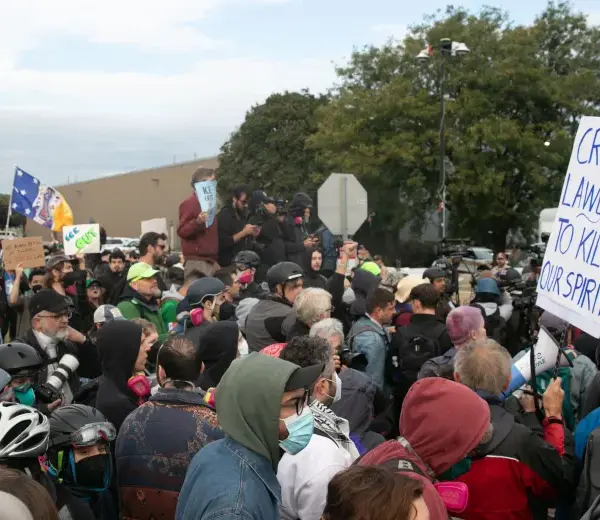
Abughazaleh’s Involvement and Public Persona
Kat Abughazaleh is known both as a political newcomer and a progressive activist deeply involved in digital media and public policy debates. Before launching her congressional campaign, she built a large online following as a commentator focusing on:
-
immigration issues
-
economic justice
-
policing
-
civil liberties
-
government accountability
Her supporters describe her as:
-
outspoken
-
energetic
-
deeply committed to immigrant communities
-
unafraid to challenge federal authority
Her critics, however, argue that she engages in confrontational activism that sometimes crosses the line into unlawful conduct.
Her appearance at the Broadview protests came as no surprise to her followers. She had openly documented her presence there in videos and posts, often uplifting the voices of families impacted by ICE procedures.
Her Public Response: “This Is a Political Prosecution”
Following the indictment, Abughazaleh issued a strong statement calling the charges unjust and politically motivated.
She argued that:
-
the protests were peaceful
-
demonstrators were exercising First Amendment rights
-
federal officers escalated tensions
-
the indictment is meant to intimidate activists
-
her political candidacy is influencing federal scrutiny
“This is a political prosecution,” her statement read. “This is a blatant attempt to discourage dissent and to criminalize activism. I refuse to be silenced.”
Her campaign has continued without interruption, and her supporters have rallied around her, framing the indictment as an unfair attempt to tarnish her candidacy.
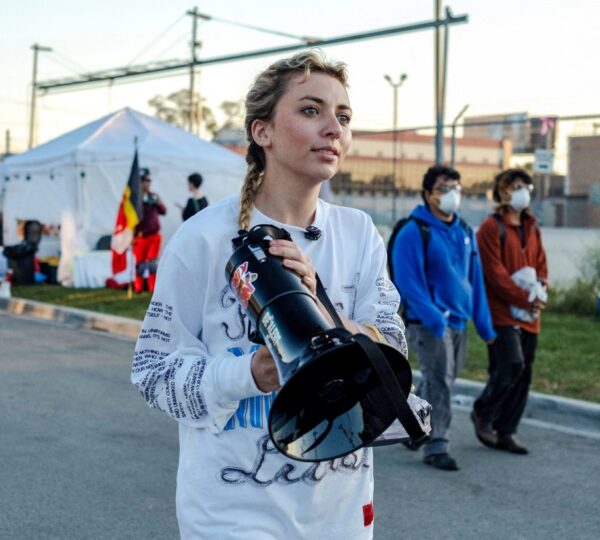
Reactions From the Community and Immigrant Advocacy Groups
The response to the indictment has been polarized.
Supporters argue:
-
The charges represent an attempt to suppress grassroots movements.
-
Federal authorities are targeting activists rather than addressing humanitarian concerns.
-
Civil disobedience has historically played an important role in social change.
-
The indictment could discourage public participation in movements for immigrant justice.
Several organizations have released statements defending Abughazaleh and calling for the charges to be dropped.
Critics argue:
-
Blocking federal vehicles creates safety risks.
-
No protest should interfere with law enforcement duties.
-
Political candidates must be held to the same legal standards as everyone else.
-
Officers should not be confronted or impeded during the performance of official duties.
The divide reflects broader tensions in national discourse over immigration enforcement and public activism.
Legal Experts Weigh In: Is This Case Unusual?
Legal scholars have offered varied interpretations of the charges:
Some argue that the indictment is routine
They note that federal interference charges have been brought before, particularly in cases involving:
-
obstruction of federal transportation
-
physical interference with officers
-
damage to government property
According to this view, the case reflects existing law and is not politically exceptional.
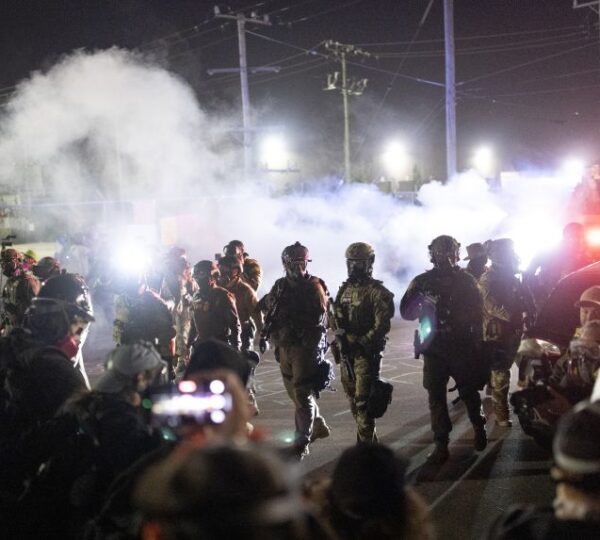
Others believe the timing and context matter greatly
Given that:
-
Abughazaleh is a political candidate
-
the demonstrations involved immigration enforcement
-
the protests were widely publicized
Some experts argue that prosecutors may be sending a message regarding the limits of civil disobedience.
And some warn of broader implications
Certain civil rights attorneys suggest that the case could set a precedent for how future protests—especially those involving federal agencies—are policed, investigated, and prosecuted.
Parallel Case: Rep. LaMonica McIver
The indictment of Abughazaleh follows a separate case earlier this year involving New Jersey Rep. LaMonica McIver, who also faces federal charges for allegedly interfering with ICE officers during an oversight visit.
The existence of two similar cases in a short period has sparked concerns among progressive lawmakers and immigration groups, who fear a new trend of aggressive federal responses to protests near immigration facilities.
Political Implications for the Illinois 9th District Race
Abughazaleh is running in a crowded Democratic primary. Her campaign has emphasized progressive reform, grassroots organizing, and community empowerment.
The indictment introduces new political dynamics:
-
Some voters may see her charges as evidence of courage and conviction.
-
Others may question her judgment or suitability for federal office.
-
Political opponents may use the indictment as a talking point during debates.
-
Donors, volunteers, and community organizations may adjust their strategies depending on how the case progresses.
At minimum, the indictment guarantees that immigration enforcement and protest rights will become defining issues in her congressional race.
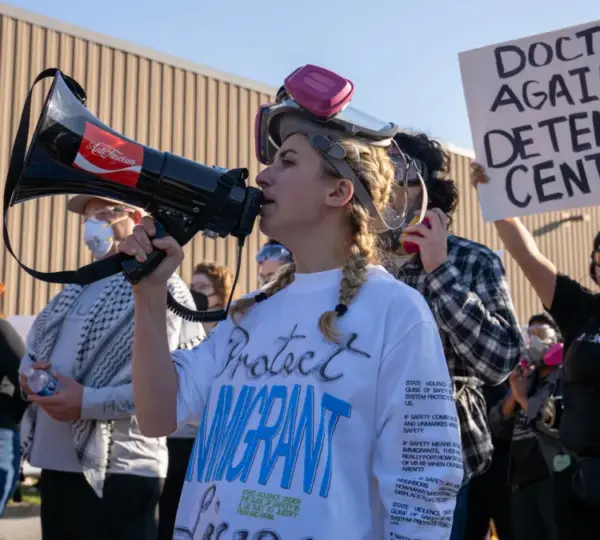
The Road Ahead: What Happens Next?
None of the six defendants have been arrested. Instead, all have been permitted to self-surrender on November 5.
The case has been assigned to U.S. District Judge April M. Perry.
Next steps may include:
-
arraignment and formal plea
-
pretrial motions
-
evidentiary hearings
-
potential negotiations
-
trial scheduling
Legal experts say the case could take months or even years to reach a final resolution, depending on motions filed and the complexity of evidence.
A Moment of National Reflection on Protest, Power, and Public Responsibility
Regardless of the ultimate legal outcome, the case of Kat Abughazaleh has already become symbolic. It captures a larger national conversation about:
-
how citizens should express dissent
-
what lines protesters may or may not cross
-
how federal agencies respond to civil disobedience
-
what responsibilities political candidates have when joining public movements
-
whether current federal laws adequately balance safety and free speech
The indictment forces the nation to confront these questions in a very real, very human context—one involving families, communities, law enforcement officers, and an aspiring legislator who says she will continue her campaign while fighting the charges.
The indictment of congressional candidate Kat Abughazaleh has quickly evolved from a regional legal matter into a nationally discussed event, capturing the attention of activists, lawmakers, immigration advocates, and constitutional scholars across the country.
The charges—filed by a federal grand jury in Illinois—stem from demonstrations outside a U.S. Immigration and Customs Enforcement (ICE) detention facility in Broadview, Illinois.
The case sits at the intersection of multiple ongoing debates: the limits of civil disobedience, the role of federal agencies in immigration enforcement, the rights of protesters, and the responsibilities of political candidates who participate in activist movements.
While protests outside ICE facilities are not new, the decision to pursue federal charges against a congressional candidate has intensified scrutiny and raised complex questions that continue to ripple through national media.
A Closer Look at the Charges Filed Against Abughazaleh
According to the federal indictment filed on October 23, prosecutors allege that Abughazaleh engaged in actions that “physically hindered and impeded” a federal officer during the performance of official duties. The document names two core charges:
1. Conspiracy to impede a federal officer
This count alleges that Abughazaleh and five others engaged in coordinated actions intended to obstruct a federal agent working at the Broadview ICE facility. Prosecutors claim the group planned, organized, and executed efforts to interfere with the movement of official vehicles used to transport detainees.
2. Forcibly interfering with a federal employee
The second charge asserts that Abughazaleh stood directly in the path of a moving federal vehicle, forcing the driver to reduce speed dramatically. Federal agents maintain that the action created a dangerous situation, both for the protesters and for the officer attempting to complete a routine transfer of detainees.
The indictment points to video evidence, officer testimony, and additional surveillance footage from the surrounding area.

What Prosecutors Say Happened During the Protest
According to the Justice Department, the protest escalated beyond peaceful demonstration during several key moments:
-
Protesters allegedly surrounded ICE vehicles, forming human chains and chanting slogans.
-
Some individuals reportedly struck federal vehicles, causing scratches and minor damage.
-
Agents claim they were “significantly impeded” while trying to perform lawful duties inside the facility.
-
At one point, an officer inside a government SUV had to creep forward at “an extremely slow speed” to avoid injuring demonstrators.
-
The indictment suggests that these actions were “planned and encouraged” by multiple individuals, including Abughazaleh.
Federal officials characterized the demonstrations as “highly disruptive,” though they acknowledged that many of the protests remained peaceful.
The Broader Context: Why the Broadview ICE Facility Became a Flashpoint
The Broadview detention facility has long been a central gathering point for immigration advocates in Illinois.
Community members frequently gather outside the facility during deportation operations, vigils, and organized demonstrations, citing concerns about:
-
treatment of detainees
-
deportation practices
-
family separations
-
transparency regarding ICE procedures
-
the emotional toll on local immigrant communities
For years, Broadview has been a symbolic site for immigrant families who fear losing loved ones. Weekend vigils often attract faith groups, nonprofit leaders, and human rights organizations.
But in recent months, the activity intensified significantly. Protests grew larger, more frequent, and more confrontational as national debate over immigration enforcement heightened. The demonstrations expanded beyond traditional advocacy groups to include local politicians, student coalitions, social media activists, and independent journalists.

Abughazaleh’s Involvement and Public Persona
Kat Abughazaleh is known both as a political newcomer and a progressive activist deeply involved in digital media and public policy debates. Before launching her congressional campaign, she built a large online following as a commentator focusing on:
-
immigration issues
-
economic justice
-
policing
-
civil liberties
-
government accountability
Her supporters describe her as:
-
outspoken
-
energetic
-
deeply committed to immigrant communities
-
unafraid to challenge federal authority
Her critics, however, argue that she engages in confrontational activism that sometimes crosses the line into unlawful conduct.
Her appearance at the Broadview protests came as no surprise to her followers. She had openly documented her presence there in videos and posts, often uplifting the voices of families impacted by ICE procedures.
Her Public Response: “This Is a Political Prosecution”
Following the indictment, Abughazaleh issued a strong statement calling the charges unjust and politically motivated.
She argued that:
-
the protests were peaceful
-
demonstrators were exercising First Amendment rights
-
federal officers escalated tensions
-
the indictment is meant to intimidate activists
-
her political candidacy is influencing federal scrutiny
“This is a political prosecution,” her statement read. “This is a blatant attempt to discourage dissent and to criminalize activism. I refuse to be silenced.”
Her campaign has continued without interruption, and her supporters have rallied around her, framing the indictment as an unfair attempt to tarnish her candidacy.

Reactions From the Community and Immigrant Advocacy Groups
The response to the indictment has been polarized.
Supporters argue:
-
The charges represent an attempt to suppress grassroots movements.
-
Federal authorities are targeting activists rather than addressing humanitarian concerns.
-
Civil disobedience has historically played an important role in social change.
-
The indictment could discourage public participation in movements for immigrant justice.
Several organizations have released statements defending Abughazaleh and calling for the charges to be dropped.
Critics argue:
-
Blocking federal vehicles creates safety risks.
-
No protest should interfere with law enforcement duties.
-
Political candidates must be held to the same legal standards as everyone else.
-
Officers should not be confronted or impeded during the performance of official duties.
The divide reflects broader tensions in national discourse over immigration enforcement and public activism.
Legal Experts Weigh In: Is This Case Unusual?
Legal scholars have offered varied interpretations of the charges:
Some argue that the indictment is routine
They note that federal interference charges have been brought before, particularly in cases involving:
-
obstruction of federal transportation
-
physical interference with officers
-
damage to government property
According to this view, the case reflects existing law and is not politically exceptional.

Others believe the timing and context matter greatly
Given that:
-
Abughazaleh is a political candidate
-
the demonstrations involved immigration enforcement
-
the protests were widely publicized
Some experts argue that prosecutors may be sending a message regarding the limits of civil disobedience.
And some warn of broader implications
Certain civil rights attorneys suggest that the case could set a precedent for how future protests—especially those involving federal agencies—are policed, investigated, and prosecuted.
Parallel Case: Rep. LaMonica McIver
The indictment of Abughazaleh follows a separate case earlier this year involving New Jersey Rep. LaMonica McIver, who also faces federal charges for allegedly interfering with ICE officers during an oversight visit.
The existence of two similar cases in a short period has sparked concerns among progressive lawmakers and immigration groups, who fear a new trend of aggressive federal responses to protests near immigration facilities.
Political Implications for the Illinois 9th District Race
Abughazaleh is running in a crowded Democratic primary. Her campaign has emphasized progressive reform, grassroots organizing, and community empowerment.
The indictment introduces new political dynamics:
-
Some voters may see her charges as evidence of courage and conviction.
-
Others may question her judgment or suitability for federal office.
-
Political opponents may use the indictment as a talking point during debates.
-
Donors, volunteers, and community organizations may adjust their strategies depending on how the case progresses.
At minimum, the indictment guarantees that immigration enforcement and protest rights will become defining issues in her congressional race.

The Road Ahead: What Happens Next?
None of the six defendants have been arrested. Instead, all have been permitted to self-surrender on November 5.
The case has been assigned to U.S. District Judge April M. Perry.
Next steps may include:
-
arraignment and formal plea
-
pretrial motions
-
evidentiary hearings
-
potential negotiations
-
trial scheduling
Legal experts say the case could take months or even years to reach a final resolution, depending on motions filed and the complexity of evidence.
A Moment of National Reflection on Protest, Power, and Public Responsibility
Regardless of the ultimate legal outcome, the case of Kat Abughazaleh has already become symbolic. It captures a larger national conversation about:
-
how citizens should express dissent
-
what lines protesters may or may not cross
-
how federal agencies respond to civil disobedience
-
what responsibilities political candidates have when joining public movements
-
whether current federal laws adequately balance safety and free speech
The indictment forces the nation to confront these questions in a very real, very human context—one involving families, communities, law enforcement officers, and an aspiring legislator who says she will continue her campaign while fighting the charges.